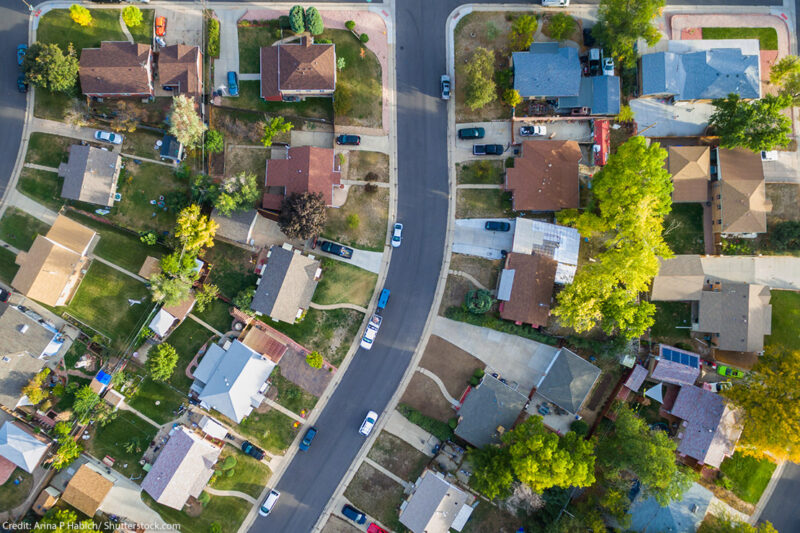
The housing crisis is both the cause and effect of systemic civil rights deprivations.
By Taylor Pendergrass
In 1966, Dr. Martin Luther King, Jr., and Coretta Scott King left their single-family home in Atlanta’s Vine City neighborhood and moved into an apartment on Chicago’s west side. Their goal? To draw attention to the fight for equitable housing.
“If Martin Luther King, Jr., and his family moved into a slum area, I think even the media would begin to look at the slum area more closely,” said Coretta King.
The Fair Housing Act (FHA) had been introduced that same year and was championed by Dr. King. This civil rights legislation aimed to prohibit discrimination by landlords, real estate agents, and banks — but it was going nowhere fast in a country where exclusionary zoning laws and redlining had made legalized housing segregation as American as apple pie.
It was only after Dr. King’s assassination and a direct appeal from President Lyndon B. Johnson that the FHA was passed  and signed into law days after Dr. King’s death. As one housing advocate said, “Fair housing was something that he literally died for.”
and signed into law days after Dr. King’s death. As one housing advocate said, “Fair housing was something that he literally died for.”
In the late 1960s, Dr. King and the civil rights movement had made open housing their priority because they understood that access to housing was itself a basic human right. They also knew that housing access was intertwined with dismantling other systemic inequalities like unequal access to education, racist and violent policing, and the racial wealth gap.
Sixty years later, in every state across the country, housing is once again the civil rights issue of our time.
Why the Right to Housing Still Doesn’t Extend to Everyone
In Colorado, where I live, our towns and neighborhoods still mirror the scars of displacement, exclusion and segregation. That began centuries ago with the theft of Indigenous and Hispanic lands and continued through Denver’s aggressive redlining that officially ended only a few short decades ago. Amazingly, Colorado communities were working to remove racist covenants just last year.
In Dr. King’s time, explicit racism kept people of color from home ownership. In our time, mortgage-approval algorithms reinforce longstanding racial bias embedded through computer code.
In either case, the end results are the same. Today, when compared to similarly situated white borrowers, one study shows lenders are 40 percent more likely to turn down Latino applicants for loans, 50 percent more likely to deny Asian American Pacific Islander (AAPI) applicants, 70 percent more likely to deny Indigenous applicants, and 80 percent more likely to reject Black applicants.
Recent census data show 68 percent of white Coloradoans own their own home, but only 52 percent of Hispanic or Latino Coloradans and 41 percent of Black families. These homeownership disparities directly contribute to intergenerational wealth gaps. In Colorado, the median white family in the country had about $184,000 in wealth compared to just $38,000 and $23,000 for the median Hispanic and Black families.
The rental market is similarly rigged for inequality. Colorado is among the top 10 worst states in the country regarding the gap between renters’ income and rent. Low-income renters and renters of color suffer the most. Onerous application processes and income qualifications are barriers to renters of color and disabled renters, as well as continuing direct discrimination.
A lack of access to housing is the upstream cause of the downstream crisis for unhoused people. One statistic tells a lot of the story: every $100 increase in median rent is associated with a 9 percent increase in the homelessness rate.
As in every American city, Colorado’s unhoused population reflects historic racial discrimination. For example, in Denver, Black individuals are overrepresented by 3.6 times as compared to Denver’s general population, Indigenous people by 4 times, and Asian American Pacific Islanders by 4.5 times.
Unhoused people suffer some of the most egregious civil rights abuses of our time. Those harms include constant criminalization, the never-ending homeless-to-jail cycle, police abuse, and the indiscriminate destruction of irreplaceable property in deadly and heartless “sweeps.”
Whether people are trying to buy a home, rent an apartment, or simply get off the street, the access to housing crisis is both the cause and effect of systemic civil rights deprivations.
How We’re Working to Improve a Broken and Biased System
The ACLU has been fighting over decades for fair housing, including just evictions, housing protections for survivors of domestic violence, drawing the connection between housing segregation and police abuse, and suing over racially discriminatory lending practices.
But unprecedented crises call for unprecedented responses. That is why ACLU of Colorado is recommitting itself to a new, multi-year campaign joining the fight for access to housing. And at the national ACLU, we’re expanding our fair housing work through our Systemic Equality program, with a focus on reducing mass evictions and barriers to housing opportunities through a multi-pronged litigation campaign, and advocating for the right to representation to ensure all people facing eviction have the ability to assert their rights in court. We will work for and alongside people and communities impacted by housing insecurity, advocates, and other experts, to address the root causes of these systemic inequalities as well as the many symptoms.
As Dr. King taught us nearly 60 years ago, the housing crisis is, in fact, a civil rights crisis.
Taylor Pendergrass, Director of Advocacy, ACLU of Colorado







Dr. King would have been denied housing by the Davis-connected buyer’s program at WDAAC. The same program that some of the local housing / civil rights activists had “no problem with”.
Sort of like how these same activists are so concerned about local climate action plans (and housing shortages), but had “no problem with” DISC.
See a pattern, here? Somehow, they find a way to put forth arguments that they themselves don’t believe in. To them, it’s more development itself that they actually believe in. At some point, it becomes so obvious that it’s laughable.
Then again, there is not a single home in Davis that MLK would have been able to purchase a house. So perhaps rather than singling out one location, you might look at the totality of housing policies.
Discriminatory housing laws based upon race were deemed unenforceable back in 1948.
Regardless, I’m referring to TODAY. If he was still alive, he would be barred from obtaining housing at WDAAC. (Though I’m not sure of the status of that discriminatory program.)
Regarding the “totality” of housing, I suspect he’d be able to buy 10 houses in Davis (outside of WDAAC), if he was alive today. He’d be wealthy (if he chose to be), by this time. (It would be interesting to know if his family benefited from any of this.)
https://www.foxbusiness.com/money/martin-luther-king-jr-nobel-prize
“I’m referring to TODAY. If he was still alive, he would be barred from obtaining housing at WDAAC. ”
Me too. If he was still alive, a preacher could not afford to purchase a house in Davis.
Did you read that brief article regarding the value of Dr. King’s items? Including a dispute involving his children?
(Actually, there’s quite a few “preachers” who are EXTREMELY wealthy.)
https://www.celebritynetworth.com/richest-celebrities/joel-osteen-net-worth/#:~:text=Joel%20Osteen%20is%20an%20American,Lakewood%20Church%20in%20Houston%2C%20Texas.
No – you wouldn’t under that program. Except by age, which is legal.
Unlike you, Dr. King would have been prevented from obtaining a residence at WDAAC – unless he subsequently established a connection to Davis.
But since you’re primarily focused on affordability, here’s some good news for you:
https://www.redfin.com/city/16409/CA/Sacramento/housing-market
And regarding housing prices (an issue that you seem to be obsessed with), it sounds like anyone who wants to purchase a house should wait awhile longer:
https://www.noradarealestate.com/blog/california-housing-market/#:~:text=The%20median%20home%20price%20in%20California%20is%20expected%20to%20drop,2022%20from%20%24786%2C700%20in%202021.
I’ve heard (from multiple sources) that prices are actually dropping faster than they did during the last housing crash, but that it actually takes several years for it to fully unfold. You might recall that the last housing crash lasted from around 2007 – 2011.
Personally, I’d be rooting for more interest rate increases (and economic/population downturn), if I was trying to buy a house. The reason being that few people keep the same mortgage (or even the same home) for the entire 30-year period of most mortgages. In contrast to the sales price – which is “permanent” (and is also used to calculate base property taxes – rising 2% each year beyond that).
https://www.noradarealestate.com/blog/california-housing-market/#:~:text=The%20median%20home%20price%20in%20California%20is%20expected%20to%20drop,2022%20from%20%24786%2C700%20in%202021.
The University Airport on campus can accommodate small business jets, so I suspect there are any number of megachurch/huckster preachers who can afford to live in Davis today!